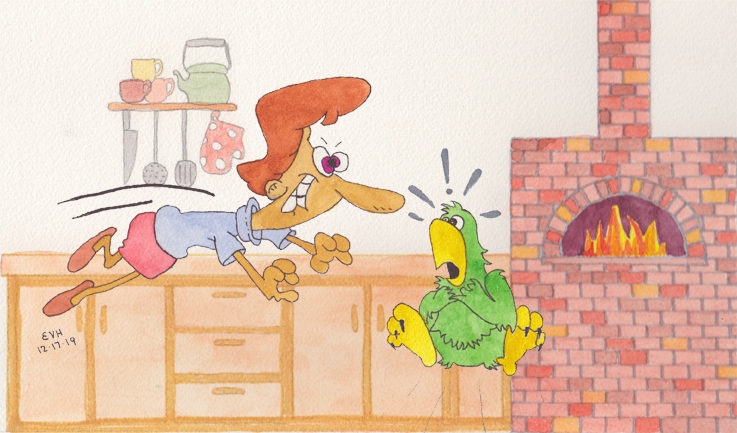
Jataka 198
Rādha Jātaka
The Story of Rādha
as told by Eric Van Horn
originally translated by William Henry Denham Rouse, Cambridge University
originally edited by Professor Edward Byles Cowell, Cambridge University
This story is almost identical to Jātaka 145. It is about the futility of trying to guard against someone who is determined to be unfaithful, and what a trap it is to desire such a person. The broader lesson is about the dangers in sense desire generally. Sense desire gets us into all sorts of trouble, most especially sexual desire. The Buddha’s way is to abandon sense desire, replacing it with serenity, tranquility, and bliss. That is a kind of happiness that – as the Buddha taught – is safe and blameless.
The name “Poṭṭhapāda” is interesting. There is a discourse called the “Poṭṭhapāda Sutta.” It is the ninth discourse in the Digha Nikāya [DN]. In DN 9 Poṭṭapāda is a wanderer (“paribbājaka”) who asks the Buddha about some of the most fundamental philosophical issues of the time. This includes most notably the Buddha’s teachings on non-self. At the end of this discourse Poṭṭapāda became a lay follower of the Buddha.
“I come, my son.” The Master told this story while he was at Jetavana. It is about a monk who was a backslider.
We hear that the Master asked him if he really was a backslider. He replied, yes, he was. Being asked why, he replied, “Because my passions were aroused on seeing a beautifully dressed woman.” Then the Master said, “Brother, there is no benefit to watching women. In days gone, guards were placed to watch an unfaithful woman, and yet they could not keep her from misbehaving. If you marry someone who is untrue, you cannot keep them from illicit affairs.” And he told this story of the past.
Once upon a time, when Brahmadatta was the King of Benares, the Bodhisatta came into the world as a young parrot. His name was “Rādha” and his youngest brother was named “Poṭṭhapāda.” While they were still quite young both of them were caught by a fowler and handed over to a brahmin in Benares. The brahmin cared for them as if they were his children. But the brahmin’s wife was a wicked woman. There was no way to keep her from mischief.
The husband had to go away on business, and he told his young parrots, “Little dears, I am going away on business. Keep watch on your mother in season and out of season. See whether any men come to see her.” So off he went, leaving his wife in charge of the young parrots.
As soon as he was gone, the woman began to misbehave. Men came to see her night and day. There was no end to them. Poṭṭhapāda, observing this, said to Rādha, “Our master put this woman into our charge, and here she is acting wickedly. I will talk to her.”
“Don’t,” Rādha said. But Poṭṭhapāda would not listen. “Mother,” he said, “why do you misbehave?”
How she longed to kill him! But pretending that she was going to embrace him, she said, “Little one, you are my son! I will never misbehave again! Here, then, little dear!” So he went up to her. She grabbed him crying, “What! You preach to me! You don’t know your place!” And she wrung his neck and threw him into the oven.

Figure: Figure: Poṭṭhapāda’s Demise
After some time passed the brahmin returned. Once he had rested, he asked the Bodhisatta, “Well, my dear, what about your mother. Has she been faithful or not?” And as he asked the question, he repeated the first couplet:
“I come, my son, the journey done, and now I am at home again,
Come tell me is your mother true? Does she make love to other men?”
Rādha answered, “Father dear, the wise do not speak of things that are not to be blessed, whether they have happened or not.” And he explained this by repeating the second couplet:
“For what he said he now lies dead, burnt up beneath the ashes there,
It is not well the truth to tell, lest Poṭṭhapāda’s fate I share.”
Thus did the Bodhisatta hold forth to the brahmin. And he continued, “This is no place for me to live in either.” Then bidding the brahmin farewell, he flew away to the woods.
When the Master had ended this discourse, he taught the Four Noble Truths, at the conclusion of which the backsliding monk reached the Fruit of the First Path (stream-entry). He then identified the birth: “Ānanda was Poṭṭhapāda, and I was Rādha.”
